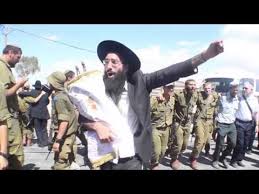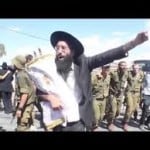Moshe Kempinski
The country of Israel, today ,is embroiled in a bitter dispute which hearkens back to the every soul and nature of this country. The return to Zion in our era began with Torah faithful Jews such as the students of the Gaon of Vilna as well as with members of several of the Hassidic groups.They joined with the impoverished communities of Jews of the Old Yishuv that had never left the land, in Tiberias, Jerusalem and Tzfat. The return continued with the Hovevei Tzion ( Lovers of Zion) movement, that in the 1800’s succeeded in establishing communities like Rishon LeTzion and Mishkenot Shaananim .
Today these pioneers are finally being seen as the forerunners and foundation-builders of modern Zionism.Yet their immediate impact remained small. It took the massive Aliyah movements that were predominately secular to push the fledgling community into statehood.
Therein were sown the seeds of modern day disputes.
At the time of the formation of Israel’s fledgling army in 1948, Ben Gurion came to an agreement with the Chazon Ish, the leader of the Haredi Orthodox community in Israel. The secular leadership at the time were intent on creating a “ New Jewish Persona” in the new born state. The Orthodox establishment were concerned , with justification, that placing their young boys under secular command in the army would destroy their commitment to faith.
Ben Gurion on the other hand stipulated that with the deferment of army service cane a prohibition of seeking a job. They would be allowed to learn but could not then simply go out to work. This agreement created the impossible situation that a whole vibrant and growing community could not legally go into the work place to sustain itself. Elsewhere in the world Haredi individuals function as doctors lawyers and businessmen, while in Israel that became illegal.
This was a system that could not be sustained and recently a growing group of Haredi civilians found ways to enter the armed service and still maintain their level of Jewish life. This process came to an abrupt end after the last election .The brash and, at times, arrogant Yesh Atid party decided to impose new rules and after 65 years, coerce a society to conform to its whims and desires. All this under the threat of financial and legal punitive measures. It is not surprising, then, that the Haredi community recoiled and set up barricades of fear and hatred. The religious Zionist community that attempted to bridge those two opposing radical views then became the object of abuse and scorn from both sides.
The Torah portion of Pekudei offers the solution very clearly.
The Torah portions of Vaykhel and Pekudei are usually read together in the synagogues. When the year becomes a leap year they are separated, though thematically they are intrinsically connected. In the portion of Vaykhel ( and Moshe assembled) the Torah teaches the power of being intrinsically connected to the Klal or peoplehood of Israel. The common purpose and destiny of the peoplehood of Israel carries within it the power to elevate, empower and heal the individual souls that make up the people.
Yet the portion of Pekudei teaches us the importance and necessity of each individual in that KLAL .The Torah portion begins with the words” These are the countings ( Pikudei) of the Mishkan, the Mishkan of the Testimony, which were counted at Moses’ command.( Exodus 38: ). The Tabernacle was built through the generous giving of the heart of all the people of Israel..” Every man whose heart uplifted him came, and everyone whose spirit inspired him to generosity brought the offering of the Lord for the work of the Tent of Meeting,”( Exodus 35:21-22).)
The tabernacle which houses the glory of Hashem therefore was filled and created by the hearts and souls of every individual in the people of Israel. So what does the word Pekudei ( countings ) teach us? One of its layers of meaning becomes clarified in the story of David and Saul.
The young David goes into hiding, fearing the wrath of King Saul. He tells his close friend Yonatan, the son of Saul, what to say if his absence at the feast of the new month will be noticed “If your father miss me at all (Pakod Yifkideni), then say: David earnestly asked leave of me that he might run to Bethlehem his city; for it is the yearly sacrifice there for all the family. (I Samuel 20:6)
The word Pakod does not only mean “to count” but to count so as to make sure that nothing is missing. To make sure no one is missing because everyone is critical otherwise the tabernacle could not achieve its purpose. What was true of the Tabernacle is true of the nation of Israel. When the opposing factions begin to realize and feel the vision and the pain of the other side, then the healing can begin. At this point we only hear and read of arrogance hatred and recrimination. When the ultra-secularists and the Haredi community begin to realize that they desperately need each other, only then will this nation will become the vessel for G-d’s plan of destiny.


I can’t help but also recall that in more than one place in the Torah, there is a census taken of all men over the age of 20 who are able bodied to go out to war (Numbers 1:3 and 26:2). Being able bodied didn’t have anything to do with whether or not they were students of Torah. Probably the best early student of Torah was Joshua. Let’s see, he was a general, a servant, a prayer warrior, a man chosen and directed by God to lead the children of Israel according to Torah standards while at the same time being strong and courageous. Being a soldier and being a warrior for God do not conflict with one another.
you are right…your homework will be…why is that so…enjoy